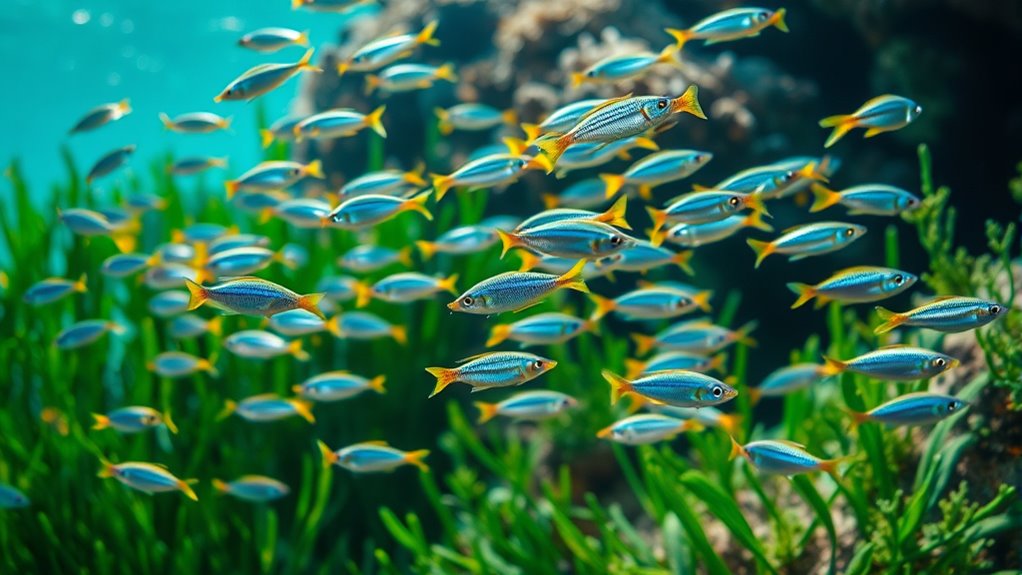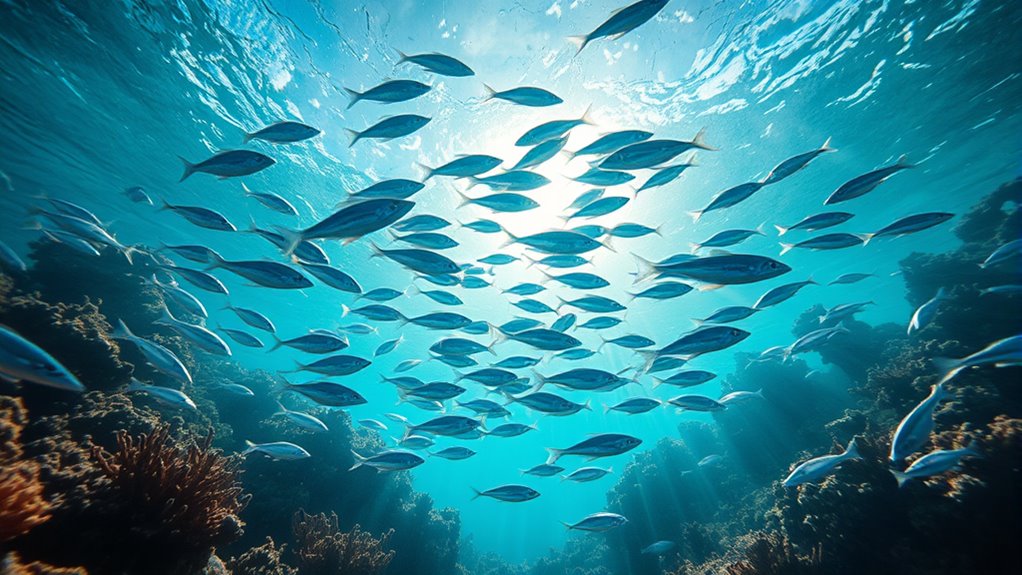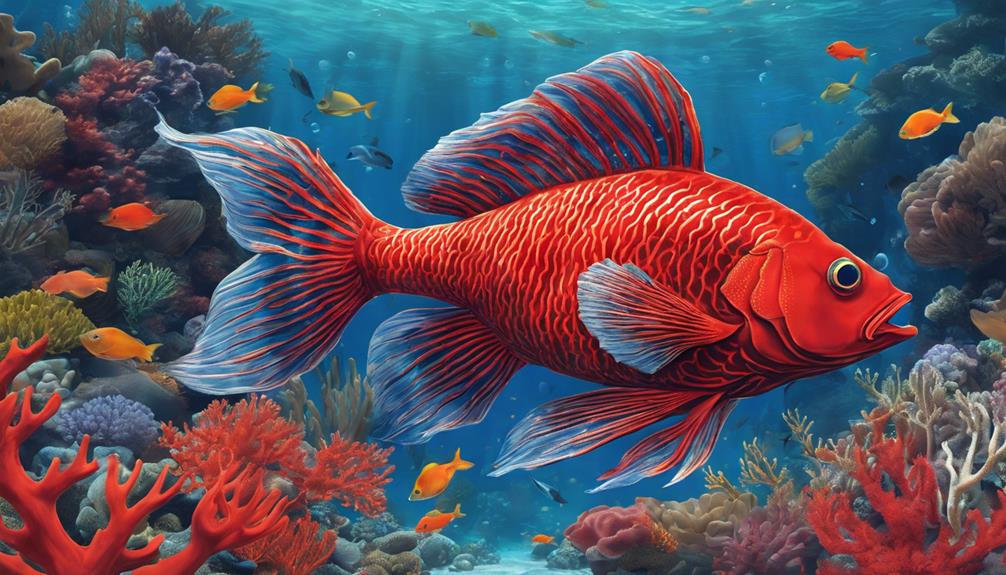Recent discoveries show that fish can remember events for up to five months, which surprises many because it challenges previous beliefs about their intelligence. You might think fish have fleeting memories, but research proves they recognize individuals, remember food sources, and learn from experiences. This extended memory helps them avoid predators and navigate their environment better. If you’re curious, you’ll find more fascinating details behind what makes fish smarter than you might expect.
Key Takeaways
- Fish can remember important information, such as food locations and predators, for up to five months.
- Recent studies show that fish possess long-term memory capabilities, contradicting earlier beliefs of fleeting memories.
- Experiments demonstrate fish can retain learned cues and behaviors over extended periods.
- This extended memory span indicates advanced neural processes and cognitive abilities in fish.
- Recognizing fish’s long-term memory influences conservation efforts and challenges perceptions of aquatic intelligence.

Recent research shows that fish remember things much longer than scientists once believed. This discovery challenges long-standing assumptions about fish intelligence and highlights the complexity of aquatic cognition. You might think of fish as simple creatures with fleeting memories, but new evidence suggests they can retain information for up to five months. This means their cognitive abilities are far more advanced than previously acknowledged, and their behavior reflects a deeper level of awareness.
Fish memory spans up to five months, revealing surprising intelligence and behavioral complexity.
Understanding fish intelligence is essential because it reveals how these animals navigate their environment, find food, and avoid predators. Studies have demonstrated that fish can recognize individual members of their species, remember specific locations of food sources, and even learn from experience. For example, some species can be trained to perform tasks or remember complex routes, demonstrating a form of problem-solving and memory retention that rivals many mammals. This capacity for aquatic cognition indicates that fish are capable of more sophisticated thought processes than we often give them credit for.
You might find it surprising that fish can recall events months after they occur. This extended memory span implies they can adapt their behavior based on past experiences, which is essential for survival in dynamic environments. The ability to remember the location of a safe hiding spot or recognize a predator from previous encounters allows them to react swiftly and effectively in dangerous situations. Such memory skills also suggest that fish have a level of social awareness, as they can remember interactions with other fish and adjust their behavior accordingly. Additionally, research into fish cognition reveals that their neural processes are capable of long-term memory storage, further emphasizing their intelligence.
Recent experiments have involved training fish to associate certain cues with food or danger, and the results show they retain this information for significant periods. This evidence confirms that aquatic cognition involves complex neural processes capable of storing and retrieving memories over long durations. As a result, you should view fish not merely as instinct-driven creatures but as intelligent beings with impressive cognitive capacities. They can learn, remember, and adapt, which impacts how we approach their care and conservation.
Frequently Asked Questions
Do Different Fish Species Have Varying Memory Spans?
You might wonder if different fish species have varying memory spans. Yes, species variation plays a role, with some fish remembering things for months, while others have shorter memories. Habitat influence also affects memory; fish in complex environments tend to develop better memory skills. So, your observations depend on the species and their surroundings, showing that fish memory isn’t uniform and varies based on their type and habitat.
How Does Fish Memory Affect Their Social Behavior?
You might notice that a fish’s memory influences its social behavior considerably. When fish remember past interactions, it affects their stress responses and territorial behaviors. For example, if they recall previous threats or conflicts, they may become more aggressive or cautious, impacting group dynamics. A longer memory span helps fish adapt better to their environment, reducing unnecessary stress and fostering stable territorial boundaries, which benefits their overall social structure.
Can Fish Remember Specific Objects or Locations?
Think fish can’t recognize objects or remember locations? Think again! You’d be surprised how sharp their memory really is. Fish demonstrate impressive object recognition and navigation skills, often recalling specific objects or spots for months. This surprising ability helps them find food and avoid predators, proving that even underwater, memory plays a bigger role than we give credit for. So, next time you see a fish, remember—its brain is smarter than it looks!
What Methods Are Used to Test Fish Memory?
To test fish memory, you observe their visual memory and associative learning. You might show fish specific objects or signals and then see if they recognize or respond to them later. For example, you could train fish to associate a certain color or sound with food, then test if they remember the connection after days or months. These methods reveal how well fish retain information and learn from their environment.
Does Fish Memory Improve With Age or Experience?
You might think fish memory doesn’t change much, but with fish training, you can see how experience boosts memory enhancement. As they learn new tasks, their memory can improve over time, proving they can turn over a new leaf. While age plays a role, it’s really the repeated training and interactions that sharpen their recall. So, yes, fish can learn new tricks, showing that practice makes perfect in the underwater world.
Conclusion
So, next time you see a fish dart by, remember—it might just remember you for up to five months, longer than you ever expected. It’s funny how these tiny creatures can surprise us with their memory skills, isn’t it? Maybe that’s why they seem so aware of their surroundings. Sometimes, life’s little coincidences reveal just how much we still have to learn about the world beneath the waves—and about ourselves.










